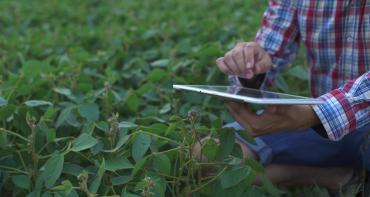Blog by Benjamin Kwasi Addom, Adviser on Agriculture & Fisheries Trade Policy, The Commonwealth Connectivity Agenda

Agricultural data is the bedrock of digital agriculture innovations, consisting of digital technologies and digital services. With the saying that “data is the new oil”, agricultural data can also be considered a resource like oil or gold. And all resources require infrastructure to exploit or manage.
So how can data put food on a table for a hungry person?
The threat to global food security is one of the major concerns for policymakers across the globe. In the Commonwealth, agriculture ensures food security and employment for over half of its 2.5 billion people.
The agricultural data ecosystem is complex. This may include content data such as soil maps, agronomic data, weather data, financial data, production data, yield data, market data, etc., and user data such as data on the entities - farmers, traders, enterprises, consumers, research networks, extension networks, financial institutions and cooperatives.
"The value of agricultural data continues to increase in the digital age, the speed and volume of data being generated provides the basis for investment into the sector and enable sound policy decision-making and timely advisory services to farmers."
The challenge
Despite data being labelled as the new oil, most countries lack national infrastructure for managing agricultural data. Within any typical national agricultural data ecosystem, several stakeholder groups are involved in the management of data (generation, aggregation, processing, analysis, sharing, and use). Unfortunately, there is a lack of coordination in managing agricultural data. This has led to fragmented data systems, the unwillingness of data holders to share data, duplication of data systems, operational inefficiencies, data collection fatigue on data subjects, failure to scale innovations based on data, unsuitable policies developed on fragmented data points, and a data power imbalance between the “data owners” and “data holders”.
The long-term effect of policy inaction by national governments could be a weak national digital sovereignty - the power and authority of national governments to make free decisions affecting citizens and businesses within the digital domain.
A recent article by the World Economic Forum (WEF)1 – “Here's how the agricultural sector can solve its data problem”1 clearly laid out the challenge including fragmentation, lack of standards, and limitations in the interchange of agricultural data. It argues that WEF aims to drive industry coordination by developing a common format for the interchange of agricultural data.
A new approach – Digital Public Infrastructure (DPI) for agricultural data
According to the United Nations, countries with robust public infrastructure are better equipped to meet the needs of their people and accelerate action towards the United Nations Sustainable Development Goals (SDGs).
Infrastructure powers societies, provides the fundamental services and systems that enable economies, allows for communication, facilitates the creation and growth of other systems, and supports daily activities.
There is a need for a national approach to managing agricultural data and the concept of Digital Public Infrastructure (DPI) may be that approach. DPIs are considered digital solutions that enable the basic functions essential for public and private service delivery. There are already use cases of DPI in the Commonwealth including digital identity (Aadhaar) and real-time fast United Payment Interface (UPI) in India; digital systems for real-time Covid-19 screening, contact tracing, and monitoring system in Sri Lanka; and a digital cash payment programme in Togo that helped the country’s most vulnerable people during the Covid-19 pandemic.
The use case for agriculture is however missing. Agricultural data infrastructure, as argued in the State of Digital Agriculture in the Commonwealth report2 represents a use case of DPI for agricultural sector upon which other digital agricultural services can be built. DPI for agriculture may consist of the following components:
- Technological/Data System: A component that supports data registries, data identifiers, etc. for up-to-date data, accurate data products, and adheres to data principles and interoperability across countries.
- Social/Principles Component: A component that creates opportunities for data standards across a range of data sources, supports data privacy and protection for owners/contributors, support data ethics, and enables data sharing, use and re-use.
- Governance/Administration Component: Governance models that emphasizes neutrality and representation of stakeholders such as data custodians, stewards, trustees, etc. with multi-stakeholder entity to administer the DPI.
- Business/Market Component: A business component that ensures fair and scalable access with a social/public case for financing, and a business case for private sector investors that maintains and sustains the infrastructure.
Looking ahead, there is a need to understand the current situation in each country, agree on whether there is a need for a national approach to data coordination within the agricultural innovation ecosystem, create awareness around the risks of inaction for governments - especially the risk against national digital sovereignty, build consensus on the way forward, and begin the process of developing the DPI use case for agriculture.
The Commonwealth Secretariat’s Connectivity Agenda is well placed to lead a consortium of partners to roll out this coordinated and long-term investment in agricultural data management for national, regional, and global decision-making for agricultural production and trade in low and middle-income countries (LMICs).
About the Commonwealth Connectivity Agenda
1. https://www.weforum.org/agenda/2023/01/here-s-how-agricultural-sector-data-problem-davos2023/
2. https://state-digitalagriculture.thecommonwealth.org/digital-agriculture/
Media contact
- Rena Gashumba Communications Adviser, Communications Division, Commonwealth Secretariat
- T: +44 7483 919 968 | E-mail



